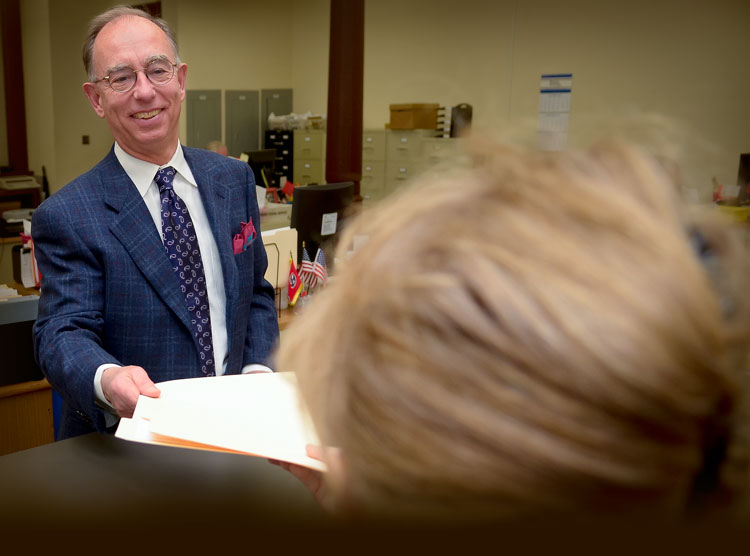Cliff Rodgers has spent his adult life around politics without being very political. He worked for U.S. Sen. Howard Baker’s law firm, clerked for U.S. District Judge James Jarvis and is currently administrator of elections for Knox County.
Rodgers, 66, grew up in Bearden in a staunch Republican family who worked the Rocky Hill polling place on Election Day. He attended Bearden schools from the first through 12th grade. “I still see guys around town I knew in the first grade.” He got a degree in political science at the University of Tennessee. While spending a year getting ready to go to law school, he was in sales for M.S. McClellan men’s clothier and was manager of the store on Cumberland Avenue. He worked part-time at the store while attending college.
He wasn’t sure what he wanted to do when he graduated. He thought he might try the FBI. But he took a job as a law clerk for what was then the Baker Worthington law firm and was soon promoted to associate.
Baker was the rainmaker who kept everyone at the firm busy. Rodgers recalls that each year the firm’s employees gathered at Sen. Baker’s home in Huntsville for a picnic and a tennis tournament. He was paired with Baker in the first round, and managing partner Bob Worthington advised him not to screw up. He got a friend to give him some lessons, and he was relieved when he and Baker prevailed. In the next round he had Baker as an opponent. “I had the good sense not to win again.”
When Jarvis was appointed to the federal bench, Rodgers became his clerk and served for 23 years. The association started off with a bang when a dozen East Tennessee sheriffs were indicted in a massive FBI sting operation involving sheriffs doing the bidding of drug dealers.
In the early 1990s, Jarvis and the other federal judges decided clerks should not be involved in politics – no campaign contributions, no politicking, no involvement in the election process. “I was relieved.” He noticed that when presidents change it is common for jobs in the federal judiciary to flip as well. And there were good people of both parties doing good work. “The Founding Fathers got it right when they wanted judges appointed to keep them out of politics.” But as clerk he made a lot of contacts with some big-name Republicans, such as U.S. Sen. Fred Thompson and state Sen. Carl Koella, a powerful politician in the Tennessee legislature who hailed from Blount County and was a good friend of Jarvis.
But when Jarvis retired, as is traditional, his clerk became unemployed. Rodgers says he was relieved in a way, not having three different briefs to write at any one time.
Rodgers was 49 years old when he married wife Margaret. Margaret Rodgers had been a sports clothes designer in Europe and in New York but tired of the life and moved home to Knoxville. The couple had a daughter in 2006 born with medical problems. They lost her in 2009. Their son, born when Margaret was 51, is 8 years old, “and I have a hard time keeping up with him.”
Rodgers has gotten good marks as a fair administrator of elections. He and his eight-person staff preside over city, county, state and federal elections. A county election held in conjunction with a state primary requires 800 people to work early-voting and Election Day precincts.
One of the constant challenges is maintaining the 800 part-timers, many of whom are seniors. Working a 14-hour shift on Election Day is tiring. The election commission is always recruiting workers to replace workers lost through attrition. They’ve found that home-school parents are a good source, along with substitute teachers. If schools are closed on a particular Election Day, substitute teachers are available to work polls.
But “I hate to use schools as polling places,” says Rodgers. They are often not handicapped accessible and “security is a nightmare.” When voting occurs and school is in session you have hundreds of people going in and out of the building. “I prefer to use churches and community centers. Good parking and handicapped accessible.”
There are a lot of issues around the election process. The election commission visits each high school during the year to register 18-year-olds. Various groups conduct registration drives. The legislature tightened rules governing people paid to register voters this past session. “The problem is not getting people registered to vote, the problem is getting them to come to the polls,” says Rodgers. The newly registered 18-year-olds, for example, have about a 10 percent participation rate.
“I want three things: a lot of voters, big margins by the winners and no close votes.”
But with any change in the election law the question should be, “Does this make for better candidates and better officeholders?”

